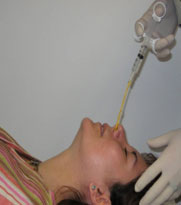Diagnosis & Treatment
Español: Diagnóstico y tratamiento
Diagnosis
Pertussis (whooping cough) can be diagnosed by taking into consideration if you have been exposed to pertussis and by doing a:
- History of typical signs & symptoms
- Physical examination
- Laboratory test which involves taking a sample of secretions (with a swab or syringe filled with saline) from the back of the throat through the nose — see Figure 1 and video demonstrations.
- Blood test

Figure 1: Proper technique for obtaining a nasopharyngeal specimen for isolation of Bordetella pertussis
Image: Manual for the Surveillance of Vaccine-Preventable Diseases, 4th ed, 2008
Treatment
Pertussis is generally treated with antibiotics and early treatment is very important. Treatment may make your infection less severe if it is started early, before coughing fits begin. Treatment can also help prevent spreading the disease to close contacts (people who have spent a lot of time around the infected person) and is necessary for stopping the spread of pertussis. Treatment after three weeks of illness is unlikely to help because the bacteria are gone from your body, even though you usually will still have symptoms. This is because the bacteria have already done damage to your body.
There are several antibiotics available to treat pertussis. If you or your child is diagnosed with pertussis, your doctor will explain how to treat the infection. Learn more about the antimicrobial treatment recommended by CDC for treatment of pertussis.
Pertussis can sometimes be very serious, requiring treatment in the hospital. Infants are at greatest risk for severe complications from pertussis. View photos of an infant being treated for pertussis in the hospital.
If Your Child is Treated for Pertussis at Home
Do not give cough medications unless instructed by your doctor. Giving cough medicine probably will not help and is often not recommended for kids younger than 4 years old.
Manage pertussis and reduce the risk of spreading it to others by:
- Following the schedule for giving antibiotics exactly as your doctor prescribed.
- Keeping your home free from irritants - as much as possible - that can trigger coughing, such as smoke, dust, and chemical fumes.
- Using a clean, cool mist vaporizer to help loosen secretions and soothe the cough.
- Practicing good handwashing.
- Drinking plenty of fluids, including water, juices, and soups, and eating fruits to prevent dehydration (lack of fluids). Report any signs of dehydration to your doctor immediately. These include dry, sticky mouth, sleepiness or tiredness, thirst, decreased urination or fewer wet diapers, few or no tears when crying, muscle weakness, headache, dizziness or lightheadedness.
- Eating small, frequent meals to help prevent vomiting if occurring.
If Your Child is Treated for Pertussis in the Hospital
Your child may need help keeping breathing passages clear, which may require suctioning (drawing out) of thick respiratory secretions. Breathing is monitored and oxygen will be given, if needed. Intravenous (IV, through the vein) fluids might be required if your child shows signs of dehydration or has difficulty eating. Precautions, like practicing good hand hygiene and keeping surfaces clean, should be taken.
Images and logos on this website which are trademarked/copyrighted or used with permission of the trademark/copyright or logo holder are not in the public domain. These images and logos have been licensed for or used with permission in the materials provided on this website. The materials in the form presented on this website may be used without seeking further permission. Any other use of trademarked/copyrighted images or logos requires permission from the trademark/copyright holder...more
![]() This graphic notice means that you are leaving an HHS Web site. For more information, please see the Exit Notification and Disclaimer policy.
This graphic notice means that you are leaving an HHS Web site. For more information, please see the Exit Notification and Disclaimer policy.
View page in
Contact Us:
- Centers for Disease Control and Prevention
1600 Clifton Rd
Atlanta, GA 30333 - 800-CDC-INFO
(800-232-4636)
TTY: (888) 232-6348
Contact CDC-INFO


